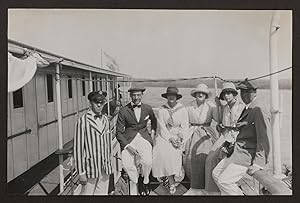About this Item
Oblong Folio (ca. 25x31,5 cm). 30 card stock leaves. With 174 mounted original gelatin silver photographs, including one large image ca. 17,5x23,5 cm (7 x 9 ½ in) and five panoramic views ca. 7x26,5 cm (2 ¾ x 10 ¼ in) or slightly smaller; the rest of the photos are from ca. 10,5x16 cm (4 ¼ x 6 ¼ in) to ca. 4,5x6,5 cm (2 x 2 ½ in). Most photos with period typewritten or manuscript white ink captions in German on the mounts. With two hand-drawn white ink maps (on the album leaves), a mounted printed map showing the route of the journey (ca. 6,5x14,5 cm) and fourteen mounted paper leaves with typewritten notes on the journey and the sites visited (from ca. 19x26,5 cm to ca. 3x21,5 cm). Original blue patterned full cloth album with decorative endpapers. Overall a very good album of interesting strong photographs. Historically significant extensively annotated album, documenting a trip up the Uruguay and Parana Rivers to the Iguazu Falls and thence to Asuncion and San Bernardino (Paraguay), taken by an upper-class German resident of Argentina in the last months of WW1. The album contains interesting photos, referring to Argentinian and Uruguayan settlements on the Uruguay and Parana River, early tourism infrastructure on the Iguazu Falls, the life of the German community in South America and the fate of the German commercial and naval fleet during WW1. A party of three young travellers named "Fritz Stadtke, Otto Bohnen and Alfredo Bohnen" (see the caption to the first photo) went on their journey to the Iguazu Falls in August-September 1918. They left Buenos Aires on board the steamer "Eolo" of the Argentine "Compañía Nacional de Navegación," owned by an immigrant from what was then Austro-Hungary Nicolas Mihanovich (1846-1929). Reaching Concordia, they took a train to Posadas and went up the Parana River onboard the "Salto" steamer. From Puerto Aguirre (now Puerto Iguazu, the Argentinian gate to the falls) they went to the Iguazu Falls by horse. On the way back, the travellers visited Paraguay's capital Asuncion and the resort town of San Bernardino. The album, compiled by one of the travellers, Fritz Stadtke, provides a lively detailed illustration of the trip, accompanied with thorough captions and notes on the history and economy of places and sites visited, and the compiler's impressions on the local hotels, food, travel companions, &c. The five panoramas show Buenos Aires port and docks, Iguazu Falls (including Garganta del Diablo), Asuncion and San Bernardino. The other photos include views of Paysandu and Salto (Uruguay), Colon (taken from "Eolo" and featuring the steamer's sign), Concordia (the main square), Posadas (Hotel "Paris," street market), plantation and processing sheds of yerba mate trees, Encarnacion (Paraguay), ruins of the San Ignacio Jesuit mission (Argentina), banks of the upper Parana River, a "Deutsche colonie in Paraguay," etc. Over eighty photos show the Iguazu Falls and Puerto Aguirre, including the grounds of the first local hotel, the site of the Triple Frontier (the borders of Argentina, Brazil and Paraguay where the Iguazu and Parana Rivers converge), numerous views of the falls taken from different positions (Garganta del Diablo, San Martin, Dos Hermanos, Bosetti, the Brasilian side, el Paso de Los Corazones), portraits of the travellers and their companions, etc. Several photos show the sites and German residents of San Bernardino ? an affluent Paraguayan resort town on the shores of the Yucarai Lake (a terrace of the Hirschfeldt family chalet, a group of horse riders on the way to Altos, children and chalet of Baroness von Koppens). Five photos in the front show Martin Garcia Island in the Rio de la Plata, where the crew of German steamer "Cap Trafalgar" was interned in 1914-1918. The photos show the island from the river, the landing pier, barracks for the interned Germans, the officers' quarters and a group of three German sailors inside their barrack. There are also interesting photos of the B. Seller Inventory # PA14
Contact seller
Report this item
![]()




